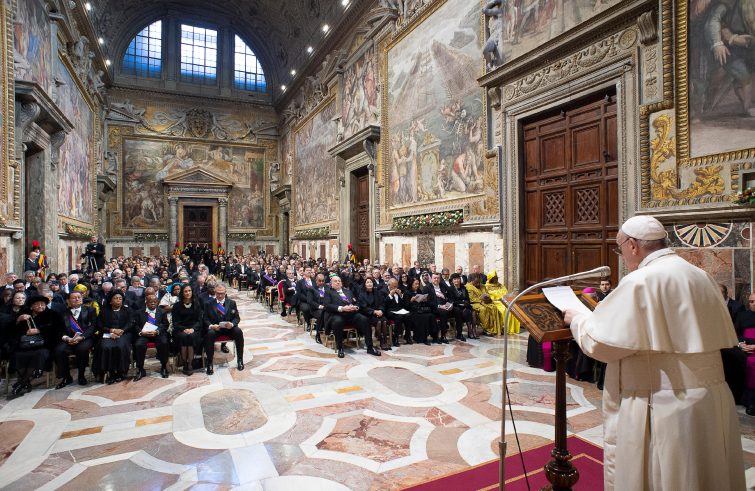
“Resolving the frozen conflicts that persist” in Europe, “some of which have lasted for decades and demand a solution, beginning with the situations involving the western Balkans and the southern Caucasus, including Georgia”. This appeal by the Pope to our continent is given a significant place in the Papal speech to the Diplomatic Corps. In it, among other things, the Pope expressed “the Holy See’s encouragement of the negotiations for the reunification of Cyprus, which would increase regional cooperation and promote the stability of the entire Mediterranean area” as well as “appreciation for the efforts made to resolve the conflict in eastern Ukraine and to put an end to the suffering of its people”. “Dialogue – not arms – is the essential way to resolve disputes”, the Pope stated, recalling Europe’s journey to peace at the end of the Second World War, which “viewed consensus and dialogue as key instruments for the resolution of conflicts”. “The founders of modern Europe realized that only through a gradual process of sharing ideals and resources would the continent be able to recover from the devastation of war and the new divisions that arose after it”, the Pope said, recalling Schuman and the European Convention on Human Rights. “The Holy See – he stressed – followed the European project with great interest from its earliest years”. Such interest, he explained, seeks “to emphasize the ideal of an inclusive process of growth inspired by a spirit of participation and solidarity”, capable of making Europe “a model of welcome and social equality guided by shared underlying values”. “The European project – the Pope pointed out – continues to be a fundamental guarantee of development for those who have long shared in it, and an opportunity for peace in the aftermath of turbulent conflicts and injuries for those countries that aspire to take part in it”. “Consequently, Europe ought not to lose that sense of solidarity that has for centuries set it apart, even at the most difficult moments of its history. May it not lose that spirit – he emphasised -, which finds its roots, among other things, in the Roman pietas and the Christian caritas that have shaped the spirit of the European peoples”.
The Pope then recalled two events that marked the year that has just ended: the fire at Notre Dame Cathedral in Paris, which “showed how even what seems so solid can be fragile and easily destroyed”; and the thirtieth anniversary of the fall of the Berlin Wall, which “has reminded us of one of the most painful symbols of the continent’s more recent history and made us realize once again how easy it is to erect barriers”. “The damage suffered by an edifice that is not only precious to Catholics but important for all of France and the whole of humanity has revived the question of Europe’s historical and cultural values and its deeper roots”, the Pope continued. “In situations where a framework of values is lacking, it becomes easier to identify elements of division than those of cohesion”. “The Berlin Wall remains emblematic of a culture of division that alienates people from one another and opens the way to extremism and violence”, Pope Francis pointed out: “We see this more and more in the hate speech widespread on the Internet and in the social communications media”.
